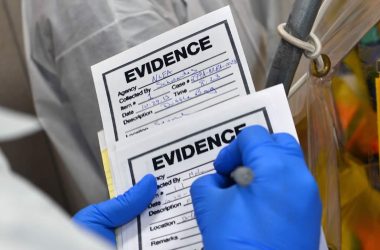CHICAGO—(ENEWSPF)—February 28, 2014. More than 200 investors in an Elk Grove Village company that purportedly made homeland security and food safety products lost more than $9 million through the offer and sale of stock, according to a federal fraud indictment against the company’s majority owner and chief executive. The defendant, GREGORY WEBB, chairman, chief executive officer, president, and majority shareholder of InfrAegis, Inc., was charged with eight counts of mail fraud and three counts of wire fraud in an 11-count indictment returned by a federal grand jury yesterday and announced today.
Webb, 68, of Dallas and formerly of Arlington Heights, will be arraigned on a date to be determined in U.S. District Court in Chicago.
The indictment also seeks forfeiture of more than $9 million in alleged fraud proceeds.
According to the indictment, between 2007 and October 2013, Webb and InfrAegis obtained more than $9 million from investors through offering and selling stock in the company by making false representations about the solvency and financial condition of InfrAegis, the contracts that it expected to be awarded or had been awarded, and the expected and actual returns on investments in the company. Webb formed InfrAegis in 2003 under the name Intelagents, Inc., and changed its name to InfrAegis in 2005.
Webb allegedly knew that stock-offering materials falsely portrayed InfrAegis as a financially successful company that had both high-level connections in the homeland security market and lucrative contracts for the sale of its products. Between 2007 and 2010, Webb and InfrAegis falsely represented in written materials and investor conference calls that the City of Chicago had agreed to install InfrAegis’ iaMedium ― a kiosk that purportedly could detect the presence of nuclear or biological weapons ― throughout the city and the agreement would result in profits of more than $80 million a year, the indictment alleges. While InfrAegis engaged in some discussions with the city about the installation of iaMediums in 2007 and 2008, there was never any agreement or contract to install the system in Chicago.
In 2009 and 2010, Webb and InfrAegis allegedly falsely represented that the company had a contract with the Washington Metropolitan Area Transit Authority (WMATA) to install iaMediums throughout the Washington, D.C., Metro train system. Again, there was never any agreement or contract beyond initial negotiations, which were terminated when WMATA determined that InfrAegis was not financially responsible.
The indictment alleges that Webb and InfrAegis concealed material facts from prospective and existing investors by failing to disclose that in 2007 and again in 2008, the Illinois Secretary of State’s Securities Department issued orders prohibiting Webb and InfrAegis from selling securities in or from Illinois until further order. Those orders were not lifted until June 2010, when Webb and InfrAegis entered into an agreement with the state requiring them to comply with state securities laws in the offer and sale of securities.
Each count of mail and wire fraud carries a maximum penalty of 20 years in prison and a $250,000 fine, and restitution is mandatory. If convicted, the court must impose a reasonable sentence under federal statutes and the advisory United States Sentencing Guidelines.
The indictment was announced by Zachary T. Fardon, United States Attorney for the Northern District of Illinois, and Robert J. Holley, Special Agent-in-Charge of the Chicago Office of the Federal Bureau of Investigation. The government is being represented by Assistant U.S. Attorneys Margaret Schneider and Kruti Trivedi.
The U.S. Securities and Exchange Commission filed a civil enforcement action against Webb and InfrAegis in 2011 in Federal Court in Chicago.
The public is reminded that an indictment contains only charges and is not evidence of guilt. The defendant is presumed innocent and is entitled to a fair trial at which the government has the burden of proving guilt beyond a reasonable doubt.
Source: justice.gov








